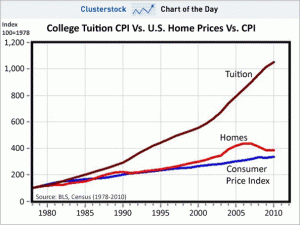Future of Education
I had an interesting conversation with another financial planner about the future of education. He had sent out a message to his clients and friends on strategies to make college affordable. The following are excerpts from messages I sent to him trying to explain why I think the educational landscape will be radically different in 20 years.
It has been shown time and again that Harvard graduates earn significantly more on average than other college graduates. This leads most people to believe that Harvard grants some advantage to their students (either through knowledge or connections). However, a study was done comparing those who got into Harvard but did not attend and those who did. Guess what they found out? There was no statistical difference between their salaries later in life. So what Harvard is actually good at is identifying people who will be more successful, not in creating that success.
Unfortunately, no equivalent study has been done on college education in general. People keep bringing out the statistics that college grads make more than those without degrees, but that does not prove causation. It is certainly possible that, like Harvard, colleges are merely identifying those individuals who are more likely to be successful in life and not actually contributing to that success.
I strongly suspect there is going to be a HUGE backlash against the current college establishment in the next 20 years or so (probably not in 10). The current rates of increase are simply unsustainable in the long run which will eventually drive people to experiment with alternatives that prove to be just as effective. I suspect that many kids born today will not follow a traditional college track as it existing today.
College costs continue to rise dramatically. The following compares tuition costs compared to CPI and home costs.
This is clearly a trend that is not sustainable in the long term. Some might even say it has clearly entered bubble territory.
The self segregation that occurs in our society really gives a warped sense of what is normal. Everyone in my circle of friends has a college education, but that certainly isn’t reflective of the whole population.
For the US population over 25
- 14% don’t have a high school diploma
- 59% have a high school diploma
- 27% have received a college degree
Around a third of that 59% have tried for the college degree but didn’t finish and are left with large debts that can’t be discharged through bankruptcy (since it is owned by the government, it will even follow you into retirement when they can garnish your social security).
Because of this self segregation, I am very leery of my or anyone else’s ability to predict how this will play out. Given that caveat, here is how I see universities and colleges being forced to change.
I suspect the agent of change for post secondary education will come from outside the existing establishment. And I expect its adoption will be driven first by developing nations. Much like cell phones ran rampant through developing nations completely skipping land line infrastructure, I expect alternate education models to gain traction much faster in developing nations where the middle class could never be expected to pay for a university education.
Our universities will initially see these alternate teaching sources as second rate and dismiss them as education for the poor unwashed masses who can’t afford a “real” education. But as these education services get better and more effective, employers will eventually realize that these alternate education methods are as effective or even more effective than what the universities are peddling. This will create a tipping point, during which only the most agile universities and colleges will survive. I could easily see half of the existing colleges and universities going out of business.
I don’t think that tipping point will come in the next 10 years, but I could easily imagine it happening in the next 20 years.
Chris Anderson’s Ted talk on global innovation provides a glimpse of how such education innovation might evolve.

